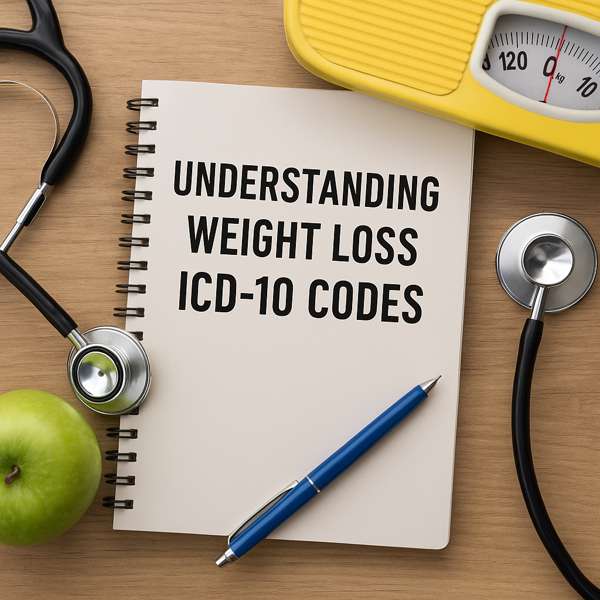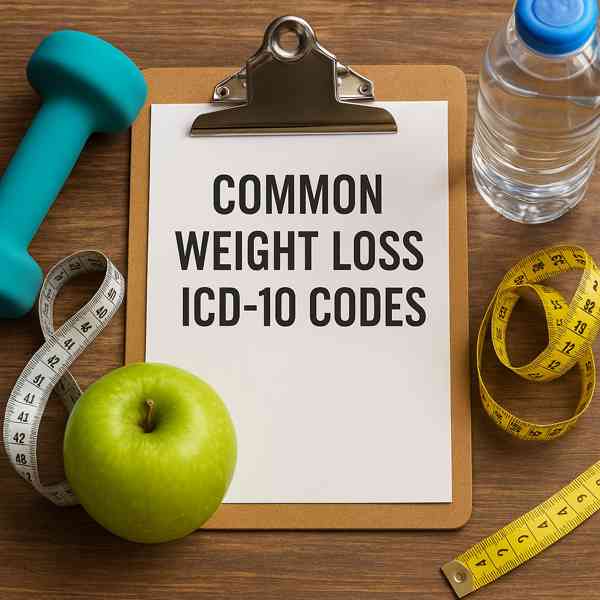Unlocking Weight Loss ICD-10 Codes: Master Weight Loss and Management Challenges
Weight loss is a topic that many people talk about. It can be a good thing when done right. But sometimes, it happens without planning. Doctors use special codes to help them understand and treat weight loss. These are called ICD-10 codes. They help in diagnosing different types of weight loss. Whether it’s unintentional or planned, these codes are important. This article will explain weight loss ICD-10 in simple words. We will talk about different types of weight loss. We will also discuss how doctors use these codes. Let’s learn more about how weight loss is recorded in medical terms.
Understanding Weight Loss ICD-10 Codes
![]()
ICD-10 stands for the International Classification of Diseases, Tenth Revision. It’s a system used by doctors all over the world. It helps them describe diseases and health problems. Each condition has a unique code. This includes weight loss too.
Weight loss ICD-10 codes help doctors know why someone is losing weight. Is it because they want to? Or is it happening without their control? These codes tell the difference. For example, if someone loses weight because they exercise and eat well, that’s an intentional loss. But if they lose weight because they’re sick, that’s unintentional.
There are many reasons why someone might lose weight. It could be due to a new diet or exercise plan. Sometimes, it’s because of stress or illness. Knowing the reason is important. It helps doctors give the right advice and treatment.
- Intentional Weight Loss: Planned efforts like diet and exercise.
- Unintentional Weight Loss: Happens without trying, often due to illness.
- Significant Weight Loss: Large amounts of weight lost, which may need attention.
- Rapid Weight Loss: Losing weight quickly, which can be risky.
Doctors use these codes to create a diagnosis. A diagnosis is when a doctor finds out what’s wrong with someone’s health. With the right diagnosis code, they can decide the best way to help. It also helps in keeping track of health records. This ensures patients get the care they need.

Common Weight Loss ICD-10 Codes
![]()
There are several ICD-10 codes related to weight loss. Each one tells a different story. Here are some that are commonly used:
- R63.4 – Abnormal Weight Loss: Used when weight loss is not normal.
- E66.9 – Obesity, Unspecified: Sometimes, losing weight is part of treating obesity.
- Z71.3 – Dietary Counseling and Surveillance: This code is used for weight loss counseling.
- P92.6 – Neonatal Weight Loss: Refers to weight loss in newborn babies.
These codes help healthcare providers understand what kind of weight loss is occurring. For instance, R63.4 is used when someone loses weight suddenly without explanation. On the other hand, Z71.3 involves helping someone manage their weight through counseling.
Using the correct code is important. It ensures that each patient receives the right treatment. It also helps in billing and insurance claims. When the right code is used, it becomes easier to process payments for medical services. This makes the whole healthcare system work better.
Let’s explore some specific situations where these codes are applied:
- A teenager who loses weight rapidly without trying might be coded as R63.4.
- An adult on a supervised diet program might fall under Z71.3.
- A newborn baby losing weight after birth might be monitored using P92.6.
Each situation is unique. That’s why having specific codes is so helpful. They make sure everyone gets the right help at the right time.

Unintentional Weight Loss: Causes and Impacts
![]()
Unintentional weight loss can be alarming. It means losing weight without trying. There are many reasons this might happen. Some of them include:
- Illness: Conditions like cancer or diabetes can cause weight loss.
- Stress: Emotional stress might lead to eating less.
- Medications: Some drugs have side effects that cause weight loss.
- Malnutrition: Not getting enough nutrients from food.
When someone experiences unintentional weight loss, it’s important to find out why. Doctors will ask questions and run tests. They use ICD-10 codes to record their findings. This helps in creating a treatment plan.
Unintentional weight loss can affect health in many ways. It might lead to weakness or fatigue. People might feel tired all the time. It can also lower the body’s defenses, making it easier to get sick.
For children and elderly people, this type of weight loss is especially concerning. Children need enough nutrition to grow. Older adults might already have weaker immune systems. Losing weight without trying can make these issues worse.
Healthcare providers take unintentional weight loss seriously. They work hard to find the cause and provide solutions. Sometimes, this involves changing medications or offering nutritional support.
In conclusion, understanding unintentional weight loss is crucial. With the right approach, it can be managed effectively. Using ICD-10 codes helps in identifying the problem quickly. This ensures patients receive the necessary care promptly.

Weight Management and Control Strategies
![]()
Weight management is important for staying healthy. It means keeping your weight in a healthy range. This can prevent many health problems. There are different strategies to manage and control weight. Here are some common ones:
- Healthy Eating: Choosing balanced meals with fruits, vegetables, proteins, and grains.
- Regular Exercise: Activities like walking, running, or sports keep the body active.
- Behavioral Changes: Setting goals and tracking progress helps stay motivated.
- Professional Guidance: Dietitians and doctors provide personalized advice.
Using ICD-10 codes like Z71.3, doctors can offer weight loss counseling. This helps patients learn how to make healthier choices. They discuss meal plans and exercise routines. This guidance is tailored to individual needs.
Weight management is not just about losing weight. It’s about maintaining a healthy lifestyle. This includes controlling Body Mass Index (BMI). BMI is a measure of body fat based on height and weight. Keeping a healthy BMI reduces the risk of diseases like heart disease and diabetes.
Sometimes, people struggle with massive weight loss. This is when a lot of weight is lost quickly. It can be difficult to gain control again. In such cases, doctors might recommend therapy or surgery.
It’s important to remember that everyone’s body is different. What works for one person might not work for another. That’s why personalized plans are effective. They consider personal preferences and health conditions.
In summary, weight management requires commitment and effort. With proper strategies and support, it becomes easier to achieve. By using ICD-10 codes, healthcare professionals can provide the best care possible.

Neonatal Weight Loss: Understanding and Monitoring
![]()
Neonatal weight loss refers to weight changes in newborns. It’s common for babies to lose some weight after birth. However, excessive weight loss can be a concern. Here’s what parents and caregivers should know:
- Initial Weight Loss: Newborns often lose up to 10% of their birth weight in the first few days.
- Causes: Fluid loss and adjusting to feeding outside the womb are typical reasons.
- Monitoring: Regular check-ups ensure the baby is gaining weight back.
- Feeding Support: Lactation consultants assist with breastfeeding techniques.
Using ICD-10 code P92.6, doctors track neonatal weight loss. This helps in providing appropriate interventions if needed. Regular monitoring ensures that any issues are addressed quickly.
If a baby doesn’t regain weight, doctors investigate further. They look into feeding practices and overall health. Sometimes, underlying medical conditions might be the cause.
Early intervention is key. Ensuring proper nutrition and hydration supports healthy growth. Parents are encouraged to seek help if they notice unusual patterns in their baby’s weight.
Breastfeeding plays a crucial role in a newborn’s nutrition. If challenges arise, lactation consultants offer valuable advice. Formula feeding is another option if breastfeeding isn’t possible.
In conclusion, neonatal weight loss is a natural process. However, careful monitoring is essential. Using ICD-10 codes helps healthcare providers track and address any concerns efficiently.

The Role of Weight Loss Counseling
![]()
Weight loss counseling is an important part of managing weight. It provides support and guidance for those looking to lose or maintain weight. Here’s how it works:
- Setting Goals: Counselors help set realistic weight loss targets.
- Creating Plans: Personalized plans are made based on individual needs.
- Tracking Progress: Regular check-ins keep clients motivated and on track.
- Emotional Support: Addressing emotional factors that affect eating habits.
ICD-10 codes like Z71.3 are used to document weight loss counseling sessions. This ensures that all aspects of care are recorded accurately.
Counselors focus on behavior changes. They teach clients about healthy eating and exercise. This knowledge empowers individuals to make better choices independently.
For some, weight loss can be challenging. Emotional factors like stress or low self-esteem might hinder progress. Counselors offer strategies to overcome these barriers.
Weight loss counseling is not just for those wanting to lose weight. It’s also beneficial for maintaining a healthy lifestyle. Learning how to balance food intake and physical activity keeps the body fit.
Overall, weight loss counseling provides comprehensive support. It addresses both physical and emotional aspects of weight management. With professional guidance, achieving and maintaining a healthy weight becomes more attainable.

Conclusion: Key Takeaways on Weight Loss ICD-10
![]()
Weight loss ICD-10 codes are vital tools in healthcare. They help identify different types of weight loss, whether intentional or unintentional. Understanding these codes allows doctors to provide the best care possible.
We explored various aspects of weight loss, including causes and impacts. From unintentional weight loss to neonatal monitoring, each scenario is unique. Using ICD-10 codes ensures accurate diagnosis and treatment.
Weight management strategies play a crucial role in maintaining health. By focusing on healthy eating and regular exercise, individuals can achieve their goals. Professional guidance through counseling offers additional support.
In conclusion, awareness and understanding of weight loss ICD-10 codes enhance healthcare delivery. They ensure that everyone receives personalized care tailored to their needs. As we continue to learn and grow, these codes remain integral in promoting health and well-being.